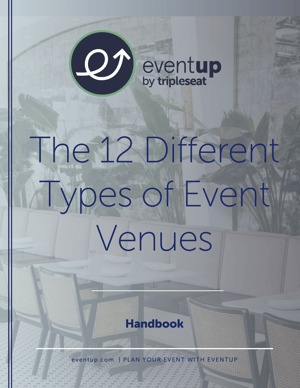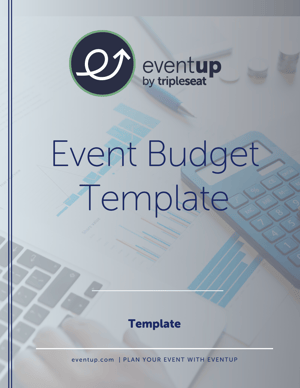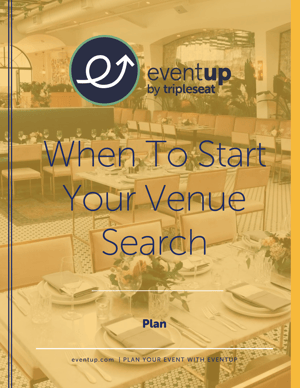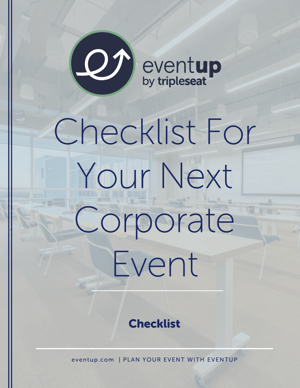The Ultimate Guide: How To Plan An Event
Have you been tasked with planning an event and need help figuring out where to start? Well, you’re in luck. No matter what type of event you need help planning, this ultimate guide will show you exactly how to plan the perfect event that guests will enjoy.
Table of Contents:
- What is Event Planning?
- Event Planning Fundamentals
- The 5 W's of Event Planning
- Steps to Planning an Event
- Specific Requirements for Social, Corporate, and Wedding Events
Event Planning Resources:

Event planning is the process of managing a project, such as a meeting, wedding, convention, tradeshow, ceremony, team-building activity, party, convention, or any other type of social gathering. Event planning includes budgeting, establishing timelines, selecting and reserving the event sites, acquiring permits, planning food, coordinating transportation, developing a theme, arranging for activities, selecting speakers and keynotes, arranging for equipment and facilities, managing risk, and developing contingency plans.
Before we jump into how to plan a social, corporate, or wedding event, there are a few event planning fundamentals to cover first. Understanding the fundamentals of event planning is like building the foundation of a new house; it helps us start on a solid foundation to design the perfect masterpiece, your upcoming event.
Types of Event Formats or Experiences
In the event planning industry, there are three main types of event formats: in-person, virtual, and hybrid.
In-Person Event
An in-person event is one where attendees gather physically in a designated location to participate in the event. This can include conferences, trade shows, networking events, and social gatherings.
Virtual Event
A virtual event is one that takes place entirely online, with attendees participating from their own computers or devices. This can include webinars, online workshops, virtual conferences, and online networking events.
Hybrid Event
A hybrid event is a combination of both in-person and virtual elements. Attendees can choose to participate in the event either in-person or virtually, with the virtual component often including live streaming of in-person sessions, interactive online activities, and virtual networking opportunities.
Each type of event format has its own unique advantages and challenges, and event planners often consider factors such as event goals, audience preferences, budget, and accessibility when deciding which format to use for a particular event.
Types of Event and Planners
There are three main buckets of events and event planners that we will cover in this guide.
- Social Events
- Corporate Events
- Wedding and/or Ceremony Events
Social Events
This is the largest group of event types and covers everything not related to weddings or corporate functions. This can be a birthday bash, an engagement party, a retirement celebration, a baby shower, a bachelorette party, and so much more.
Corporate Events
A corporate event is an event that is organized by a business or corporation for its employees, clients, partners, or other stakeholders. Corporate events can take many forms, including meetings, conferences, trade shows, product launches, team-building activities, holiday parties, and more.
Wedding and/or Ceremony Events
For the marriage between two people, we will cover both the reception and ceremony planning. Wedding and ceremony events can also be considered social events. Still, since wedding planning is such a big industry on its own, with different timelines and needs, it makes sense to bucket wedding events as its own category.
Since venues can range widely in what amenities, services, or packages they offer, it's smart to consider each of the 12 available types. The 12 Different Types of Event Venues.
Throughout your event planning, no matter what type of planner you are or what type of event you are planning, the 5 W’s are the most important factors to consider when making decisions. Having the 5 W’s answered before you start planning helps you make decisions down the road to stay focused on the overall goal of the event to meet the expectations of the audience, whether that is to learn something new, network with like-minded people, celebrate a loved one, or simply to have fun.
Who
Who is the target audience for the event? Who are the stakeholders involved in organizing the event? Who should be invited to the event?
What
What type of event is this? What is the main purpose of the event or celebration? Should this event be focused on networking, fundraising, a personal celebration, and collaborative learning?
When
When is the desired date of the event? What season or time of day works best for what you are trying to achieve? What is the timeline for planning and executing the event? What is the duration of the event?
Where
Where will the event be held, at a venue or online? Where is the ideal venue located? Is it an indoor or outdoor event? What are the logistics and infrastructure requirements for the event?
Why
Why is the event being held? What is the expected outcome or benefit of the event? Why should people attend the event? What will the audience gain from attending this event?
We created this Event Budget Template that breaks down the most important pieces of any event to help everyone break up the task of planning an event into smaller tasks while staying on budget and meeting the event's overall goals. Download the Event Budget Template
Define the Purpose and Goals of the Event
The first step in planning an event is to define its purpose and goals. Ask yourself why you are organizing the event and what you hope to achieve. This is typically easier for social events since those are geared around a birthday, celebrating the arrival of a new baby, or a retirement party. For corporate events, you may want to do a brainstorming session with all stakeholders involved to discuss what the audience will gain from attending your event.
Select an Event Date and Time of Day
Choose a date and determine a timeline for the event. When trying to find the perfect date for an event, there are a few things you will want to consider. Avoid Holidays, long weekends, or school vacation weeks, as many people often block these dates on their calendars for personal time and may not be able to attend; it can dramatically impact guest attendance. You will also want to be aware of seasonal temperatures in your desired location. Attending an event outside in the height of summer, during the day in Florida, will be an unpleasantly hot event. In this case, consider an evening event outside with a venue on the water, where the temperature will be much more enjoyable.
When to Start Your Venue Search Diagram
Finding the right balance between not reaching out too far in advance and too late can be tricky to navigate. We have broken down the timing of when you should start our research, narrowing it down to your favorites, scheduling walkthroughs, and, ideally, when invitations should be sent.
Create an Event Budget
Create a budget that includes all the costs associated with the event, such as venue rental, catering, decor, entertainment, and marketing expenses. It is important to allocate your budget wisely to ensure that you stay within your financial means.
With your budget, consider the following:
💲 Will you be providing food?
💲 Will you provide alcohol in addition to other drinks?
💲 How much can you spend on space?
💲 How long do you need the space (hours vs. days)?
💲 How many rooms do you need?
💲 Are hotel and travel options required?
💲 Do you need promotional items (flyers, videos, etc.)?
💲 Will you offer materials or promo gifts to guests?
💲 Do you need to pay for speakers?
💲 Do you need tech support such as mics, projectors, laptops, or Wi-Fi?
💲 Do you need a team for setup and event support?
💲 What kind of decorations or furniture will you need?
💲Any taxes, gratuity, or services fees
Event Budget Template
Find and Secure an Event Venue
Finding the perfect venue is easy if you use EventUp by Tripleseat, the leading global venue directory. Once you know your target audience, understand the budget you need to work within, the goals of the event, and any special accommodations or requirements, simply use the advanced filters option on EventUp to help you narrow down only those venues within your desired city that can accommodate your exact party or event.
Finding the right balance between not reaching out too far in advance and too late can be tricky to navigate.
We have broken down the timing of when you should start your research, narrowing it down to your favorites,
scheduling walkthroughs, and, ideally, when invitations should be sent. View When To Start Your Venue Search Plan.
Develop an Event Timeline
Develop a timeline that outlines all the tasks that need to be completed before, during, and after the event. Specify starting and end times, along with who is responsible for completing or managing each component. This should include deadlines for booking vendors, sending invitations, how long each segment of the party should last in which room, and completing other tasks.
Hire Vendors
Identify and hire vendors for catering, audio-visual, decor, and entertainment. Ensure that you negotiate the best prices and that they meet your event requirements.
Plan the Event Program
Develop an event program that outlines the schedule of events, including keynote speakers, breakout sessions, and networking opportunities.
Manage the Event Logistics
Manage the logistics of the event, including registration, parking, and on-site support. Ensure that all attendees have a positive experience and that everything runs smoothly.
Prepare Your Event Planner Emergency Kit Essentials
If you’re an event planner or you’ve been asked to plan an event for the first time, it’s most likely because you’re an organized and creative person. If this is your first time planning an event, let us give you a little tip - always have an emergency kit with you. You never know when the bride's dress will rip, the CEO’s black dress coat will get covered in lint, or the decorations suddenly decide the adhesive you’re using just isn't good enough. If there’s one thing you should keep in mind, it’s always to be over-prepared for any and all situations. Even then, something will come up and surprise you, and you’ll probably be adding to the below emergency list, so you’re prepared for the future!
We did our research and asked some of the best event planners around the world what’s in their emergency kits to create the best master checklist that’s out there.
As an event planner, you must be over-prepared for any situation. Here’s what you should keep in your emergency kit so you can tackle anything that is thrown your way. Download the Emergency Kit Checklist.
What you need to know about planning a social event
Decide on Your Event Theme
Arguably, the most important planning decision of any party is the overall theme of the party. The theme you decide on influences all other planning decisions, from the event space, the food you serve, any activities that are planned, and even the dress code. With a theme, there are varying degrees to which you can incorporate it throughout the party. Having a few friends join you for a bowling night is a subtle theme but still the theme of your party since it will influence the location (bowling alley) and attire (socks). Or you can go all-out with a 1920’s era inspired dress-up cocktail night at a rented mansion, complete with champagne and a band. Whichever end of the spectrum you fall on - the theme sets the stage for the entire party. Decide on a theme that you are obviously fond of but can turn into fun for all.
51 Creative Party Theme Ideas to Inspire Your 2023 Event
What you need to know about planning a corporate event
Evaluate the event
After the event, evaluate its success by measuring attendee satisfaction, the number of attendees, and the event's ROI. This will help you identify areas for improvement for future events.
Event Marketing to Boost Attendance
Unlike social events or weddings, where you would invite family and friends, corporate events may include the need for marketing if you are trying to sell tickets to attendees. Promote the event through various marketing channels, such as social media, email marketing, and advertisements. Ensure that your marketing efforts target your desired audience.
Hotel Room Blocks
Getting a discount for booking a set number of rooms for guests is common. But what happens if they don’t all fill up? If you overbook, will there be rooms set aside at the regular price? How are cancellations handled? Can you get a discount for the prepayment of the rooms?
These are all valid questions to ask when considering a venue. Know what the standard procedure is for securing rooms for your on-site guests, and get everything in writing. If there are terms that don’t fit your needs, ask if they can be changed. Many hotels are good about tweaking their standard procedures to gain your business if the request is reasonable.
How To Plan A Corporate Event at a Hotel
Guest Speakers
Choosing the right speaker for your event can be a challenging task. Some event planners need help finding the perfect guest speakers for their events. Most people are looking for speakers with a blend of humor and information that will leave the audience entertained and informed. Of course, budget plays a crucial part in choosing a speaker as well.
Here are some tips on how to choose the right guest speaker for your next event and audience.
1. Decide which type of guest speaker you want. There are many types of guest speakers out there. Determining which type you want will narrow down your options and make choosing a guest speaker much easier.
2. Entertainment versus message. What blend of entertainment value and meaningful message do you want? Some guest speakers give 100% entertainment speeches, while others give 100% informational content. Most speakers will work with you and will adapt their speech to whatever amount of entertainment and information you want.
3. Fees and Budget. You don’t think a $30 purse is the same quality as a $300 purse, right? Similarly, a speaker that charges you $500 is not going to be the same quality as a speaker who charges $5,000 per speech. When debating how much to spend on a speaker, consider the number of people in your event space and analyze the value-per-person attending to determine how much you want to invest in the speaker.
To read all nine tips on selecting the right guest speaker for your upcoming event, read the full blog post here: How to Choose the Right Guest Speaker for Your Event and Audience
What you need to know about planning a wedding or ceremony
Apply For a Marriage certificate
The requirements for obtaining a marriage certificate can vary by state, so it's important to check the specific requirements for the state where you plan to get married. You can typically find this information on the state's government website.
In most states, you'll need to apply for a marriage license before you can obtain a marriage certificate. You'll usually need to submit a completed application along with required documentation, such as identification and proof of age. You may also need to pay a fee.
Once you've obtained your marriage license, you can get married. You'll typically need to have a ceremony performed by an authorized officiant, such as a minister, justice of the peace, or another licensed individual.
After the ceremony, the officiant will usually sign and file the marriage license with the appropriate government agency. You'll typically receive a certified copy of your marriage certificate from the agency within a few weeks or months.
For example, here in Massachusetts, there is a 3-day waiting period once you apply for a marriage license. The license will then be valid for 60 days once you have it in hand.
5 Steps To Finding a Church For Your Ceremony:
1. Research potential churches
Start by researching churches in your area that allow weddings. You can use online resources like The Knot or Google to find churches that match your wedding vision.
2. Contact the church
Once you've identified a few potential churches, contact them to inquire about availability, rental fees, and any rules or regulations they may have. Many churches have specific guidelines for weddings, such as restrictions on music or decorations.
3. Schedule a visit
If the church is available and meets your needs, schedule a visit to tour the space and ask any additional questions you may have. During the visit, take note of the church's layout, seating capacity, and any additional amenities they may offer.
4. Sign a contract
Once you've decided to rent the church, make sure to sign a contract that outlines the terms of the rental agreement, including the rental fee, deposit amount, cancellation policy, and any additional rules or regulations.
5. Coordinate with the church staff
Leading up to your wedding day, make sure to coordinate with the church staff to ensure that everything runs smoothly. This may include scheduling a rehearsal, arranging for any special requests, and making sure that all vendors (such as florists and musicians) are aware of the church's rules and regulations.
Choose The Right Officiant
Before you start looking for an officiant, it's important to consider the type of ceremony you want. Do you want a religious or secular ceremony? Will it be a formal or informal affair? Knowing these details will help you narrow down your search.
Ask family members, friends, or your wedding planner for recommendations. They may know of a great officiant who is perfect for your wedding.
There are several online resources that can help you find an officiant. Websites like WeddingWire and The Knot have directories of wedding officiants in your area.
Attending local wedding shows and events can be a great way to meet officiants in person and get a sense of their personality and style.
Once you've found a few potential officiants, set up a meeting or phone call to discuss your wedding plans and get a sense of their style and personality. It's important to find an officiant who you feel comfortable with and who understands your vision for the ceremony.
After interviewing potential officiants, choose the one that best fits your vision for the ceremony. Make sure to sign a contract that outlines the terms of the officiant's services, including the fee, ceremony script, and any additional services they may offer.
Write Your Own Wedding Vows
Writing your own vows can be a beautiful way to personalize your wedding ceremony and express your love and commitment to your partner.
Before you start writing, talk with your partner about the tone and length of your vows. Do you want them to be serious or lighthearted? Do you want them to be short and sweet or longer and more detailed? Having a shared understanding of what you want your vows to be like can help guide your writing process.
Take some time to reflect on your relationship and what you love about your partner. Think about your shared experiences, your journey together, and the qualities that you admire in your partner.
Begin by writing down your thoughts and feelings about your partner and your relationship. Don't worry about being poetic or eloquent at first; just focus on expressing yourself honestly and authentically.
Consider adding personal touches to your vows, such as inside jokes, shared memories, or meaningful quotes or lyrics. This can help make your vows feel more unique and special.
Once you've written your vows, practice saying them out loud to see how they sound. You may want to make some edits or revisions to make them flow better or to clarify your meaning. Keep refining your vows until they feel just right.
Some couples choose to share their vows with each other ahead of time, while others prefer to keep them a surprise for the wedding day. Talk with your partner about what you both prefer.
Offer Wedding Guests Transportation
Providing transportation for your wedding guests can be a thoughtful and convenient way to ensure that everyone arrives at the wedding venue on time and safely.
Estimate the number of guests who will need transportation based on factors such as the location of the ceremony and reception venues and the number of out-of-town guests.
Decide on the type of transportation that will best fit your needs and budget. Options include renting a shuttle bus or van, hiring a car service or limousine, or arranging for a group discount with a local taxi or ridesharing service.
Once you've decided on the type of transportation, book it as soon as possible to ensure availability. Consider booking transportation at least a few months in advance, especially if you're getting married during peak wedding season.
Make sure to provide transportation information to your guests well in advance of the wedding day. Include details such as the pickup and drop-off locations, departure and arrival times, and any special instructions or guidelines.
Coordinate with the transportation provider to ensure that everything runs smoothly on the wedding day. Confirm the pickup and drop-off times and locations, and provide the driver with a list of guests who will be using the transportation service.
Purchase Wedding Rings
Wedding rings are a symbol of the love and commitment between partners.
Before you start shopping for wedding rings, set a budget that you're comfortable with. Wedding rings can vary widely in price depending on factors such as the metal type, gemstones, and design.
Look at several different jewelry stores and websites to compare prices, styles, and designs. Be bold and ask questions and seek advice from sales associates.
Once you've purchased your wedding rings, consider getting them insured. This can provide protection in case of loss, damage, or theft.
The Ultimate Wedding Venue Walkthrough Blog Checklist
We created the ultimate corporate event Checklist. When planning a corporate event, there are many decisions to be made and items to keep track of - all while
trying to stay on budget. Use this checklist to help you stay organized. Download the Corporate Checklist.





.png?width=300&height=388&name=Checklist%20For%20Your%20Next%20Corporate%20Event%20(1).png)







